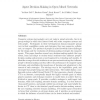Free Online Productivity Tools
i2Speak
i2Symbol
i2OCR
iTex2Img
iWeb2Print
iWeb2Shot
i2Type
iPdf2Split
iPdf2Merge
i2Bopomofo
i2Arabic
i2Style
i2Image
i2PDF
iLatex2Rtf
Sci2ools
133
Voted
AI
2010
Springer
2010
Springer
Agent decision-making in open mixed networks
Computer systems increasingly carry out tasks in mixed networks, that is in group settings in which they interact both with other computer systems and with people. Participants in these heterogeneous human-computer groups vary in their capabilities, goals, and strategies; they may cooperate, collaborate, or compete. The presence of people in mixed networks raises challenges for the design and the evaluation of decision-making strategies for computer agents. This paper describes several new decision-making models that represent, learn and adapt to various social attributes that influence people's decision-making and presents a novel approach to evaluating such models. It identifies a range of social attributes in an open-network setting that influence people's decision-making and thus affect the performance of computer-agent strategies, and establishes the importance of learning and adaptation to the success of such strategies. The settings vary in the capabilities, goals, an...
Related Content
| Added | 31 Jan 2011 |
| Updated | 31 Jan 2011 |
| Type | Journal |
| Year | 2010 |
| Where | AI |
| Authors | Ya'akov Gal, Barbara J. Grosz, Sarit Kraus, Avi Pfeffer, Stuart M. Shieber |
Comments (0)

